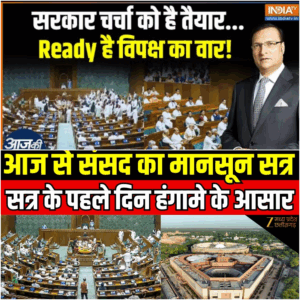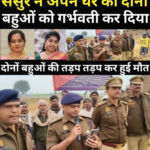Parliament’s Monsoon Session: From Modi’s Call for Unity to Uproar Over Operation Sindoor
New Delhi, July 22 – The opening day of India’s Monsoon Session in Parliament, which Prime Minister Narendra Modi had hoped would be a “festival of victory” for the nation, quickly devolved into chaos as opposition parties disrupted proceedings over demands for a focused debate on Operation Sindoor and other national security issues.
.
.
.
PM Modi’s Vision: A Session of National Pride and Unity
In his morning address, Prime Minister Modi set an optimistic tone, expressing his hope that the Monsoon Session would be remembered as a “Vijay Utsav”—a festival of victory. He highlighted the Indian Army’s exemplary courage during Operation Sindoor, stating that the operation’s success had drawn global attention to India’s military capability and the effectiveness of indigenous weapon systems.

“The world has witnessed the might of India’s military. Our forces achieved 100% of their objectives in Operation Sindoor, neutralizing terrorist masterminds within 22 minutes. This operation has showcased a new face of ‘Made in India’ defence power, attracting worldwide interest,” Modi said.
The Prime Minister urged all political parties to display the same unity in Parliament as they did internationally when presenting India’s case against terrorism. He emphasized that such unity would strengthen the morale of the armed forces and inspire further innovation and manufacturing in the defence sector, creating new employment opportunities for Indian youth.
Opposition’s Relentless Protests
Despite Modi’s appeal for unity, the opposition had arrived with a clear strategy to corner the government. They raised a barrage of questions—from the Pahalgam terror attack to Operation Sindoor and the ongoing ceasefire—accusing the government of evading accountability.
As soon as the session began, opposition MPs stormed the well of the House, demanding that all business be suspended for a dedicated discussion on Operation Sindoor. Lok Sabha Speaker Om Birla offered to allow opposition leaders to speak after the Question Hour, but the protests continued unabated.
Defence Minister Rajnath Singh and Parliamentary Affairs Minister Kiren Rijiju assured the House that the government was ready for an open discussion on Operation Sindoor, but emphasized that the debate would proceed according to parliamentary rules set by the Speaker.
Accusations of Silencing the Opposition
Congress leader Rahul Gandhi alleged that the government was suppressing opposition voices, claiming that his microphone was repeatedly turned off whenever he tried to speak. Priyanka Gandhi echoed these sentiments, questioning why the Leader of the Opposition was not being allowed to address the House if the government was truly open to debate.
However, Speaker Om Birla clarified that Rahul Gandhi would be given the opportunity to speak if Congress MPs vacated the well and allowed the House to function in order. The deadlock persisted, with both sides accusing each other of orchestrating the chaos.
A Pattern of Disruption?
The events of the day reflected a familiar pattern seen in recent sessions: opposition parties complain of being denied a voice, but when given the floor, protests and interruptions prevent meaningful debate. Even after the government agreed to allocate 25 hours for discussion on the Pahalgam attack and Operation Sindoor, the opposition shifted its demand, insisting that only the Prime Minister should respond.
The Larger Question: Debate or Protest?
This ongoing cycle raises important questions about the role of Parliament: Is it a forum for healthy discussion or simply a stage for protest? The government repeatedly stated its readiness for open debate, while the opposition’s tactics suggested a reluctance to allow the House to function smoothly.
As the session continues, the nation watches closely. Will Parliament rise to the occasion, honoring the sacrifices of the armed forces with unity and constructive debate? Or will political strategy once again overshadow the spirit of national interest?
Conclusion
The first day of the Monsoon Session, intended as a celebration of India’s military achievements and unity, instead highlighted the deepening rift between the government and opposition. As both sides dig in, the hope for a “festival of victory” in Parliament remains uncertain.
News
“Shocking! Kapil Sharma Hospitalized After Surviving Five Gunshots—His Life Hangs by a Thread!”
Bollywood in Shock: Kapil Sharma Hospitalized After Health Scare—Shooting Incident at His Canada Café Raises Alarming Questions! The world of…
“Shocking Attack! Kareena Kapoor Stabbed After Saif Ali Khan Targeted in Violent Robbery!”
Bollywood in Panic! Kareena Kapoor’s Car Attacked Just Minutes After Saif Ali Khan’s Shocking Stabbing Incident – Exclusive Details Revealed!…
“Gauri Khan’s Emotional Breakdown After Shah Rukh Khan’s Shocking Heart Attack – ICU Details Inside!”
Shah Rukh Khan Rushed to Hospital After Sudden Stroke—Gauri Khan Breaks Down in Tears! Fans Gather in Panic Outside ICU!…
“Archita Phukan’s Shocking Viral Video EXPOSED! You Won’t Believe What Happened Next!”
Archita Phukan’s Viral Controversy: The Truth Behind the Explosive Rumors! Is Social Media Star Archita Phukan Really Becoming a Porn…
Sanjay Dutt Breaks Silence on Sardar Ji 3 Casting—You Won’t Believe What He Said About Diljit Dosanjh!
Sanjay Dutt’s Explosive Statement on Diljit Dosanjh & Sardar Ji 3 Casting Goes Viral: “Working With Pakistani Actors Is Not…
Punjab Govt Fires Police Officer for Giving Mobile to Lawrence Bishnoi in Jail!
Punjab Police Rocked by Scandal: Corrupt DSP Fired for Helping Lawrence Bishnoi – Gangster Hashim Baba Now in Deep Trouble!…
End of content
No more pages to load






